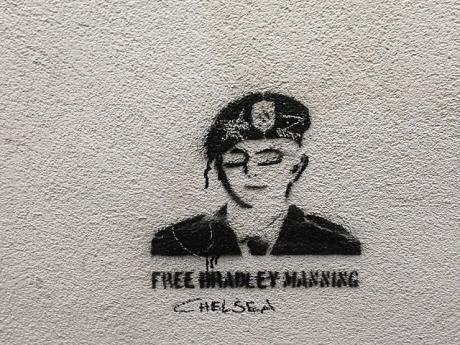In a functioning democracy, it is absolutely crucial for power to be held to account. For this we need whistleblowers.
By Rebecca Sentance. Published 2-3-2017 by openDemocracy

Free Chelsea Manning.Grafitti in Vienna, Austria, 2014. Wikicommons/smuconlaw.
On January 17, 2017, whistleblower Chelsea Manning’s 35-year prison sentence was commuted to seven years from her date of arrest, in one of President Obama’s last acts before leaving office. At the time of her commutation, Private Manning had spent more time behind bars than any other person in US history who had disclosed information considered to be in the public interest.
The information leaked by Chelsea Manning – videos, diplomatic cables and reports relating to the Iraq War and the War in Afghanistan – exposed corruption and human rights abuses, and is widely regarded to have been a catalyst for the Arab Spring that began in December 2010.
During her imprisonment, Manning was forced to endure horrific treatment, including being held as a transgender woman in an all-male prison, being denied hormone therapy and surgery for her gender transition, being forced to sleep naked whilst on suicide watch, and spending more than a year in solitary confinement – treatment considered torture by the UN. She went on hunger strike, and attempted suicide twice.
Throughout this time, campaigning by civil and digital liberties groups such as Amnesty International, Demand Progress, Fight for the Future, the American Civil Liberties Union and the various political Pirate Parties around the world kept her plight in the public eye, and eventually secured her commutation. Regardless of whether you agree with Chelsea Manning’s actions or her sentencing, she did not deserve to suffer the way that she did.
It’s thanks to the courageous actions of whistleblowers that we know the truth about the extent of the Vietnam War (Daniel Ellsberg), the Watergate scandal (William Mark Felt, Sr., aka “Deep Throat”), National Security Agency spying (Edward Snowden), HSBC banking fraud (Nicholas Wilson, aka “Mr Ethical”), the Enron scandal (Sherron Watkins), WorldCom accounting fraud (Cynthia Cooper) and countless other high-level cover-ups. We take our knowledge of these incidents for granted, but without whistleblowers (often aided by a fearless and independent press), we would still be in the dark. A lack of digital privacy makes it that much more difficult for whistleblowers, journalists and activists to hold power to account.
In a functioning democracy, it is absolutely crucial for power to be held to account. For this we need whistleblowers – but their disclosures often put them in an extremely vulnerable position as governments and corporations seek to make an example of them, to discourage further revelations. They are disproportionately punished, and branded as traitors and criminals. When this happens, it falls to activist groups and the public to support them and pay them back in kind, by making sure the facts of their situation are uncovered and brought to light.
Another key component of a functioning democracy is the right to privacy – especially online privacy. Edward Snowden’s revelations of NSA spying are just one example of the kind of intrusive, blanket surveillance that governments can enact if not kept in check. The Investigatory Powers Act that recently passed in the UK, and the bulk data collection and interception it authorises, is another.
More often than not, these intrusions are allowed through under the guise of “security” and “counter-terrorism”; we’re persuaded that they’re necessary. We’re told that “if you have nothing to hide, then what are you afraid of?” But every citizen should have a basic right to keep their own affairs private. And a lack of digital privacy makes it that much more difficult for whistleblowers, journalists and activists to hold power to account by sharing and disclosing information in the public interest.
So whenever you can, make sure that you stand up for whistleblowers and the right to online privacy. We’re going to need it now more than ever.
Rebecca Sentance is a member of the Pirate Party UK press team, and has been involved in Pirate politics since 2014. She first became interested in issues of copyright, information sharing, remix culture and online freedoms after supporting the documentary TPB AFK on Kickstarter in 2010 and researching the ideas behind it.
This article is published under a Creative Commons Attribution-NonCommercial 4.0 International licence
Editors’ note: The following related story is a reminder of why this issue is important. As this story develops, we will share additional postings on our page.
Snowden claims report Russia may ‘gift’ him to Trump proves he is not a spy

